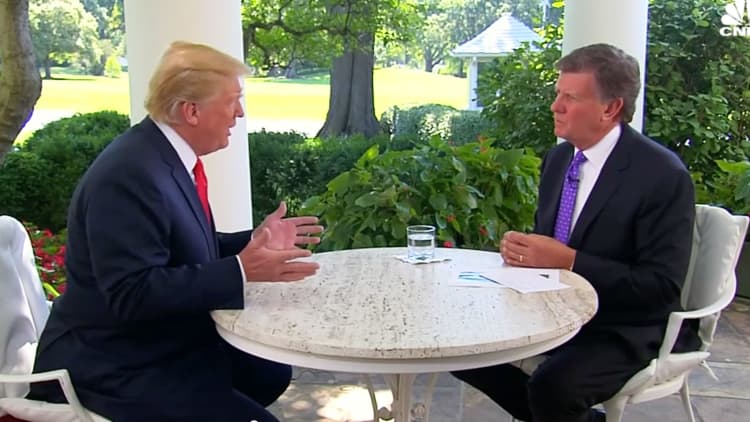U.S.-China tariffs, that have been both implemented and proposed, could cut global economic output by 0.5% in 2020, the International Monetary Fund (IMF) warned Wednesday.
Christine Lagarde, the IMF's managing director, said in a briefing note for G-20 finance ministers and central bank governors that taxing all trade between the world's two largest economies would cause some $455 billion in gross domestic product to evaporate. This would be a loss larger than South Africa's economy, it said.
"There are growing concerns over the impact of the current trade tensions. The risk is that the most recent U.S.-China tariffs could further reduce investment, productivity, and growth. The just proposed U.S. tariffs on Mexico are also of concern," Lagarde said in the blogpost.
"Indeed, there is strong evidence that the United States, China, and the world economy are the losers from the current trade tensions," she added.
Lagarde on Wednesday called them "self-inflicted wounds" that must be avoided "by removing the recently implemented trade barriers and by avoiding further barriers in whatever form."
In July last year, President Donald Trump indicated that he was willing to slap tariffs on every Chinese good imported to the U.S. should the need arise. "I'm ready to go to 500," the president told CNBC's Joe Kernen.

Signs of stabilizing growth
The estimates came as the IMF also gave a rare piece of good news for the world economy, suggesting that there were early signs that growth may have "firmed up" with central banks reversing their strategies.
The organization has been revising down its projections for global growth in recent quarters as trade tensions and concerns surrounding China have fueled sharp plunges in the stock markets and dented corporate earnings.
But in the "G-20 surveillance note," released Wednesday ahead of the formal meetings in Japan later this month, the IMF said there had been some recovery in capital flows thanks to central banks slowing their monetary policy normalization.
"Going forward, the current forecast is for global growth to increase slightly from 3.3% this year to 3.6% in 2020," the research update said.
Downside risks
However, the expected recovery came with downside risks. It said trade tensions could persist or further escalate, Brexit may end up being disorderly and China's recent stimulus measures could delay any move to a more sustainable growth pattern in the world's second-largest economy.
Negotiations between Beijing and President Donald Trump's administration took a turn for the worse in early May with the increase of tariffs on $200 billion worth of Chinese goods exported to the U.S., and an effective ban on American companies doing business with Chinese telecom giant Huawei. Beijing responded with tariffs on $60 billion worth of U.S. goods, the announcement of an "unreliable entities list" and a far tougher stance against U.S. requests.
In the last year, Chinese authorities have announced a slew of measures to improve financing to privately-run companies — which account for most of the jobs and economic growth — and tax cuts in order to boost consumption.
Meanwhile, the Brexit deadline for the U.K. has been pushed back to October 31 as the impasse at Westminster rumbles on. Prime Minister Theresa May's Brexit deal was rejected three times by U.K. lawmakers and has led to her resignation. Now a leadership contest is being held within the ruling Conservative Party which could even result in another general election later this year. The current political turmoil has only increased the chances of the U.K. leaving the EU without any deal at all.
—CNBC's Evelyn Cheng and Reuters contributed to this article.
Correction: This story has been updated to reflect that the IMF said tariffs would cut global economic output by 0.5% in 2020.


